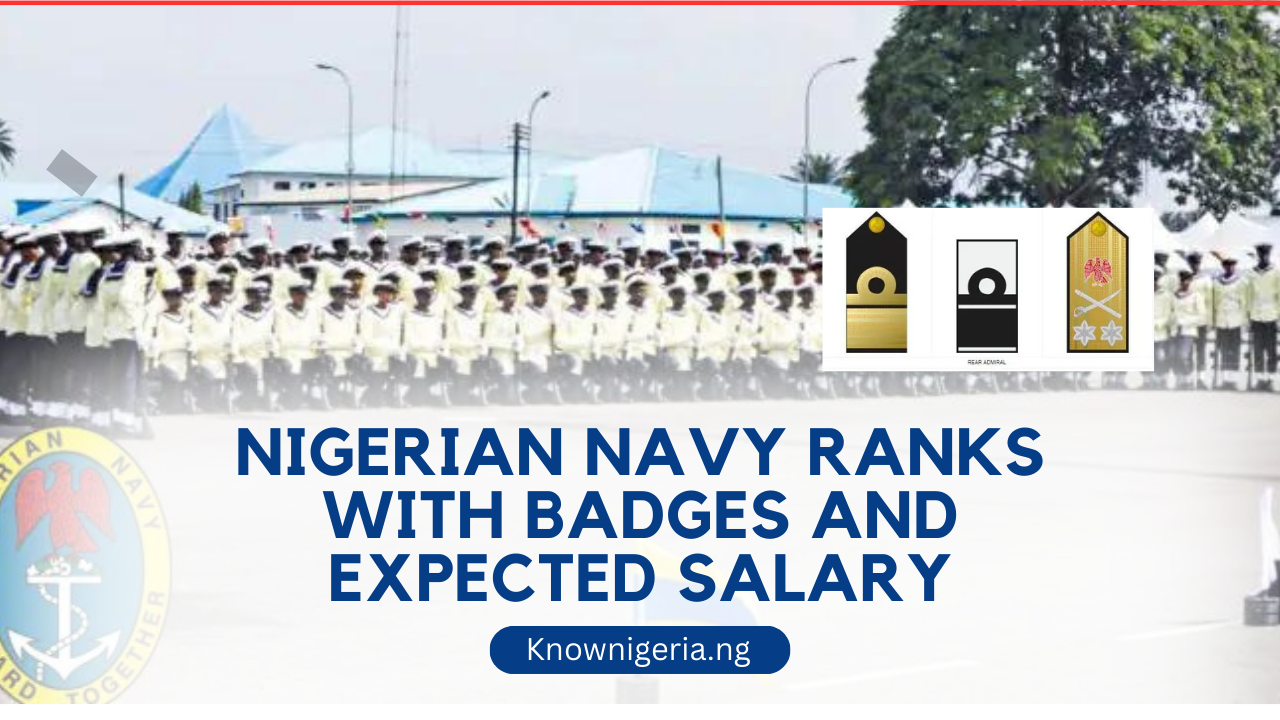The Nigerian Navy, a crucial component of the nation’s armed forces, is essential in defending Nigeria’s maritime interests and territorial seas.
The Nigerian Navy, which has a long history going back to its founding in 1956, has grown into a powerful force renowned for its professionalism and dedication to national security.
The Nigerian Navy employs a comprehensive ranking system with distinctive badges reflecting each rank to maintain organizational hierarchy and operational efficiency.
Knowing the expected pay for those serving in various roles within the Nigerian Navy besides these grades is essential.
This article thoroughly overviews the Nigerian Navy ranks and badges while illuminating the projected pay range for each position within this prestigious organization.
Table of Contents
ABOUT NIGERIAN NAVY
The Nigerian Marine Department, founded in 1914 during the colonial era, is where the Nigerian Navy’s origins may be found. Initially, the department’s significant duties included upholding colonial interests and keeping the peace in Nigerian waterways.
The Nigerian Navy was founded as a separate organization in 1956, a year before Nigeria’s independence in 1960.
It started with limited resources and a tiny fleet of ships. Over time, it has experienced substantial expansion and development to become a cutting-edge and effective naval force.
The Nigerian Navy has been essential to maintaining regional and governmental security. It has taken part in peacekeeping missions, anti-piracy operations, and regional maritime security initiatives, including Joint Operations in the Gulf of Guinea.
The navy has also participated in humanitarian aid efforts and search and rescue missions reacting to disasters.
The Nigerian Navy is still developing and improving its capabilities to successfully handle new security threats in Nigeria’s maritime area.
To defend Nigeria’s maritime interests and guarantee naval security, it works with international partners and uses cutting-edge technologies and training.
WHAT ARE THE RESPONSIBILITIES OF THE NIGERIAN NAVY?
The Main Responsibilities of the Nigerian Navy are:
Defense and Security:
To ensure Nigeria’s territorial integrity and sovereignty, the Nigerian Navy guards the country’s maritime frontiers. In addition to defending against external threats, it carries out operations to combat piracy and illegal activities like smuggling and arms trafficking.
Marine Security:
Within Nigeria’s Exclusive Economic Zone (EEZ), the Nigerian Navy aims to maintain a safe and secure marine environment. This entails conducting patrols, monitoring, and intelligence collection to prevent crime and protect maritime trade.
Law enforcement:
The Nigerian Navy works with other security organizations to enforce maritime rules and regulations. It carries out search and rescue missions, stops illegal fishing, and aids in relief operations for natural disasters.
Naval diplomacy:
The Nigerian Navy participates in international naval exercises, joint operations, and humanitarian missions to promote regional security cooperation and bolster diplomatic ties with other countries.
Read Also: 30 Unique Tribal Braids You Can Find in Nigeria
HOW ARE THE NIGERIAN NAVY RANKS ORGANIZED?
Nigeria’s navy is organized as follows:
Naval Headquarters:
The Nigerian Navy’s central command and administrative structure is the Naval Headquarters. It is situated in Nigeria’s capital city of Abuja. The Naval Headquarters develops the navy’s policies, plans, and overall strategy. It oversees the various operational commands and ensures that naval operations are coordinated and carried out effectively.
Operational Commands:
There are three operational commands in the Nigerian Navy, and each is in charge of a specific maritime region:
Lagos, Nigeria’s commercial center, serves as the headquarters for the Western Naval Command. It includes the maritime states of Lagos, Ogun, Ondo, Delta, Edo, and portions of Rivers and Bayelsa, as well as the western coastal regions of Nigeria.
To maintain maritime security, deter crime, and protect Nigeria’s territorial waters, the Western Naval Command conducts operations and patrols in this area.
Eastern Naval Command: Calabar, in the Cross River State, is where you’ll find the Eastern Naval Command. The eastern coastal regions of Nigeria, comprising the maritime states of Cross River, Akwa Ibom, Rivers, Bayelsa, and portions of Delta, are under its jurisdiction.
The Eastern Naval Command conducts operations, patrols, and surveillance missions to safeguard Nigeria’s maritime interests and counter naval threats.
Yenagoa, Bayelsa State, serves as the headquarters for the Central Naval Command. Its responsibility is to protect Nigeria’s central coast, which includes the maritime states of Bayelsa, some of the Delta, and some of the Rivers.
To preserve naval security, combat crime, and safeguard Nigeria’s marine resources, the Central Naval Command conducts operations, patrols, and surveillance missions.
Read Also: 11 Top Best HMOs in Nigeria
NIGERIAN NAVY RANKS & HIERARCHY
The rank system used by the Nigerian Navy is the same as that of other navies. In descending order, the Nigerian Navy ranks and hierarchy are as follows:
NCOs: Non-Commissioned Officers
- Rating
- Leading Score
- Chief Petty Officer, Petty Officer
- Armored Officer
Officers with commissions:
- Midshipman
- Rear Admiral Sub-Lieutenant
- Lieutenant Commander Captain Commodore
- Admiral Vice Admiral
The Nigerian Navy ranks structure represents the development from entry-level positions to higher command and leadership roles.
Within the organizational structure of the Nigerian Navy, each level is associated with particular responsibilities and obligations. Merit, seniority, and the successful completion of training and professional development requirements are often the deciding factors in promotions.
Read Also: Best Places To Learn Coding In Lagos
NIGERIAN NAVY SALARY
Salary structure: The Nigerian Navy’s salary structure varies depending on rank, years of service, and credentials. The Nigerian military pay scale establishes the wage ranges for commissioned and non-commissioned officers, subject to yearly adjustments and allowances.
Commissioned Officers
Admiral
- Yearly Salary – ₦16,303,140
- Monthly Salary – ₦1,358,595
Vice-Admiral
- Annual Salary – ₦13,363,229
- Monthly Salary – ₦1,113,602
Rear Admiral
- Annual Salary – ₦12,038,945
- Monthly Salary – ₦1,003,245
Commodore
- Annual Salary – ₦7,385,856
- Monthly Salary – ₦615,488
Captain
- Annual Salary – ₦3,715,859
- Monthly Salary – ₦309,655
Commander
- Annual Salary – ₦3,380,086
- Monthly Salary – ₦281,674
For Non-commissioned Officers
- Cadet (Training): Between N471,038 and N534,773 per year
- Warrant Officer: Between N1,022,320 and N1,192,499 per year
- Master Warrant Officer: Between N1,783,029 and N1,962,697 per year
- Navy Warrant Officer: Between N1,908,718 and N2,061,520 per year
NIGERIAN NAVY RANKS AND INSIGNIA
Here are the Nigerian Navy ranks for both commissioned and non-commissioned Nigerian Navy officers and the associated insignia.
Commission Officers
- Admiral of the Fleet (No Insignia): The President of Nigeria awards this honorary title to outstanding naval officers. This rank has no distinctive insignia.
- Admiral (4 Silver Stars) The highest rank in the Nigerian Navy may be attained is Admiral (4 Silver Stars). There are four silver stars to identify it.
- Vice-Admiral (3 Silver Stars): The Vice-Admiral rank, the second-highest in the Nigerian Navy, is indicated by three silver stars.
- Rear Admiral (two silver stars): Two silver stars designate the senior rank of rear admiral.
- Commodore (1 Silver Star): A single silver star designates the senior rank of commodore.
- Caption: A captain is a middle-ranking officer designated by three gold bars.
- Commander (2 Gold Bars): The rank of commander is symbolized by two gold bars.
- Lieutenant Commander (1 Gold Bar): A single gold bar designates a Lieutenant Commander.
- Lieutenant (2 Silver Bars): The junior officer rank of lieutenant is symbolized by two silver bars.
- Sub-Lieutenant (1 Silver Bar): A single silver bar designates the junior officer rank of sub-lieutenant.
NON-COMMISSIONED OFFICERS (NCOS)
The highest non-commissioned officer rank is known as a Warrant Chief Petty Officer, and it is indicated by the Nigerian Navy’s symbol, which has three red chevrons.
The Nigerian Navy’s symbol with two red chevrons, representing a chief petty officer, is used to identify this rank.
- Petty Officer (Navy symbol with 1 Red Chevron): The Nigerian Navy’s emblem for the rank of Petty Officer features a single red chevron.
- Leading Rating (Navy symbol with one blue chevron): The Nigerian Navy’s emblem features a blue chevron to signify Leading Rating.
- The Nigerian Navy’s symbol for Able Rating serves as a visual representation of this qualification.
- Ordinary Rating (No Insignia): The Nigerian Navy’s entry-level rank, Ordinary Rating, has no distinctive insignia.
Read Also: 10 Best Old Peoples Homes in Lagos Nigeria
HOW ARE THEY PAID
The rank and number of years of service also impact the Nigerian Navy’s non-commissioned officer pay structure. The pay ranges are described in general here:
The highest non-commissioned officer job is a Warrant Chief Petty Officer, and pay is commensurate with experience and seniority.
Chief Petty Officer and Petty Officer: Based on their qualifications, leadership responsibilities, and experience, these positions are compensated competitively.
Leading Rating, Able Rating, and Ordinary Rating non-commissioned officers are paid by their status and length of service in the Nigerian Navy.
WHAT ARE THE FACTORS THAT AFFECT NIGERIAN NAVY OFFICERS’ SALARIES?
The following variables may have an impact on an individual’s remuneration in the Nigerian Navy:
- Position and Rank: The pay scale closely relates to a person’s rank and place within the Navy’s organizational structure. Officers at higher levels typically make more money.
- Years of Service: A person’s compensation may be impacted by their length of service because they may earn periodic promotions and accompanying pay increases.
- Specific Training and Skills: Naval employees may receive pay raises or incentives due to additional training, certifications, or particular skills earned.
- Perks and Allowances: The Nigerian Navy offers a range of bonuses and allowances, including housing allowances, health insurance, and pension plans, which might affect the total salary package.
- Cost of Living: Salary levels may range depending on the cost of living in various localities, such as coastal versus interior areas.
The particular wage and allowance amounts are subject to vary over time; it is crucial to remember that. Referring to official sources or the Nigerian Navy is advised for the most current and accurate information.
FAQS
What academic prerequisites are there to join the Nigerian Navy?
A bachelor’s degree from an accredited university or other educational institution is the minimum academic prerequisite to becoming a commissioned officer in the Nigerian Navy. Depending on the admission level or specialty, different educational requirements may apply.
What is the procedure for joining the Nigerian Navy?
Those interested in applying to join the Nigerian Navy can visit the Nigerian Navy’s official website or contact the Naval Headquarters for details on recruitment drives and the application process. The standard application procedure entails submitting an online application, finishing the necessary paperwork, and taking the essential physical and written tests.
Is there a minimum age requirement to join the Nigerian Navy?
There are indeed age requirements to join the Nigerian Navy. Depending on the admission level and category, the age restrictions may change. Generally speaking, candidates must fall within a specific age range, usually between 18 and 22 years for those with a university degree and 24 years for those with professional degrees.
What level of physical fitness is necessary to join?
You must meet specific physical requirements to join the Nigerian Navy. To ensure that applicants can meet the physical rigors of naval service, the particular needs may include height and weight, physical fitness tests, medical exams, and assessments of general physical fitness.
What compensation and perks are offered to Nigerian Navy personnel?
Various benefits and allowances are provided to Nigerian Navy personnel, including housing allowances, medical benefits, leave allowances, transportation allowances, and pension plans. These compensation packages for naval personnel include these benefits and assistance.
Read Also: Beautiful Yoruba Tribal Marks and Their Unique Meanings
CONCLUSION
Understanding the Nigerian Navy ranks and badges is essential for anyone considering a career in the naval forces. The hierarchy within the Navy provides structure, discipline, and opportunities for growth and advancement.
Additionally, the salary scale offers attractive financial incentives for those who commit to serving their country through this esteemed organization.
Whether as a seaman recruit or an admiral, each rank holds its importance and responsibilities within the Navy.
If you have a passion for maritime security and are looking for a challenging yet rewarding career, consider joining the Nigerian Navy today. Your dedication and service will contribute to protecting Nigeria’s territorial waters and ensuring peace and stability in the region.
If you like the content we bring, we know you would love the awesome content we put out on our Youtube channel, Tiktok, Facebook, Instagram, and Twitter. Please subscribe and follow us for more Premium Know Nigeria content.










